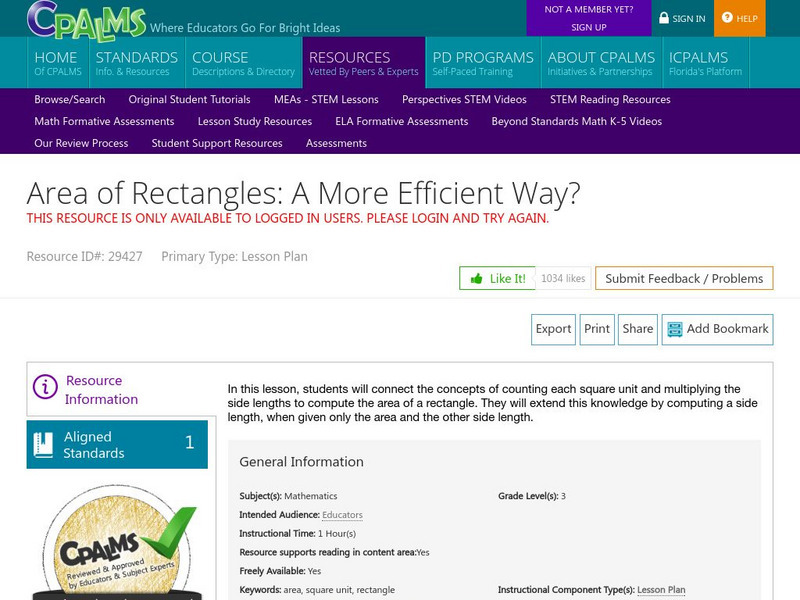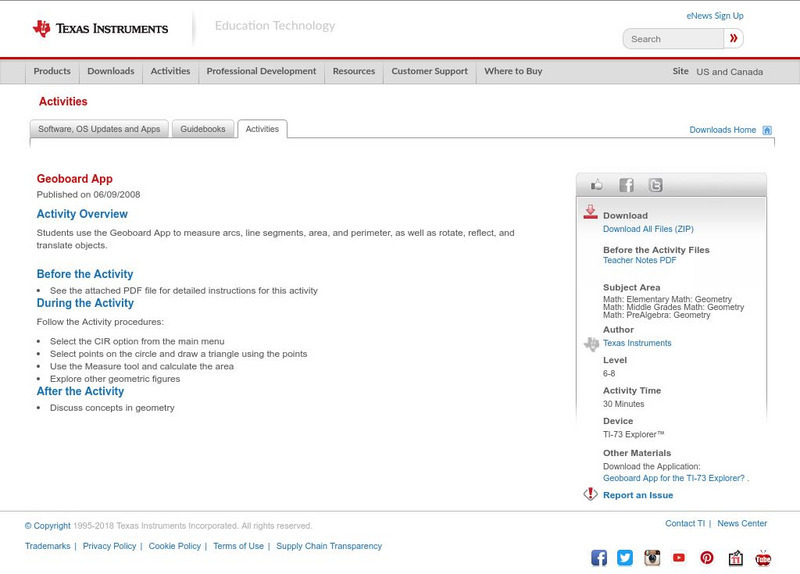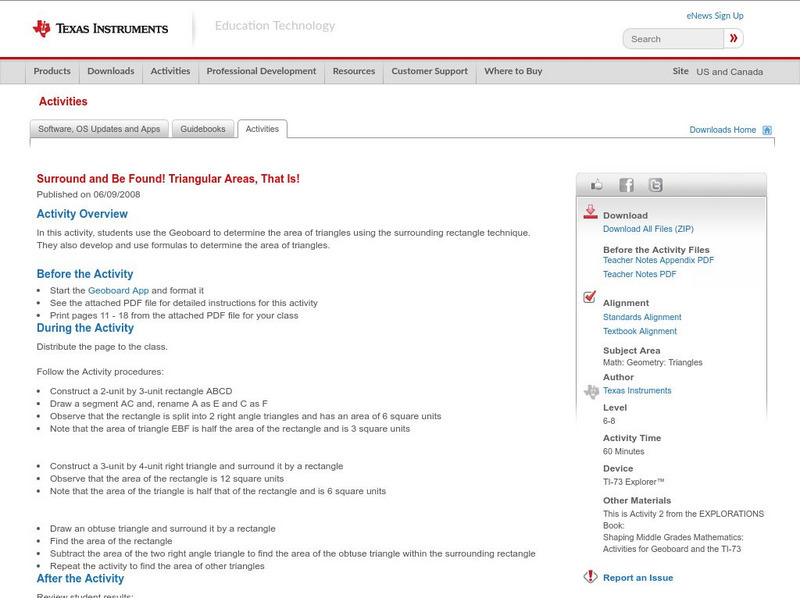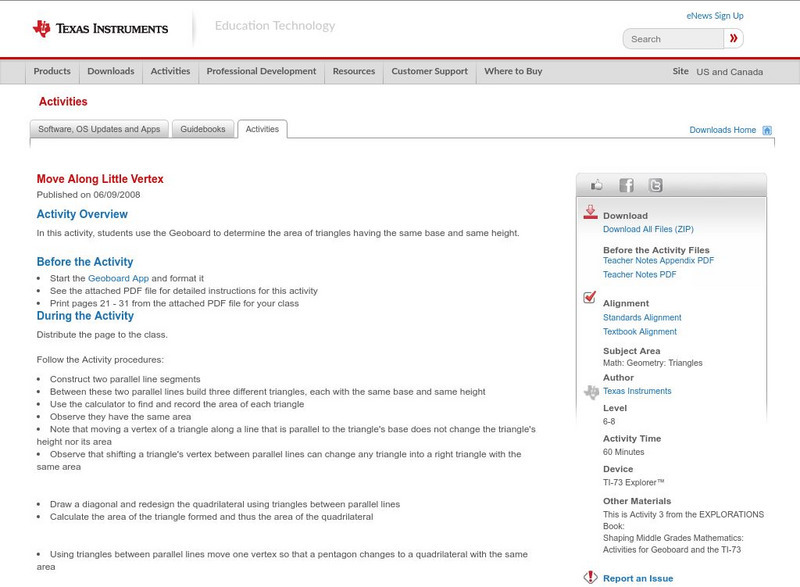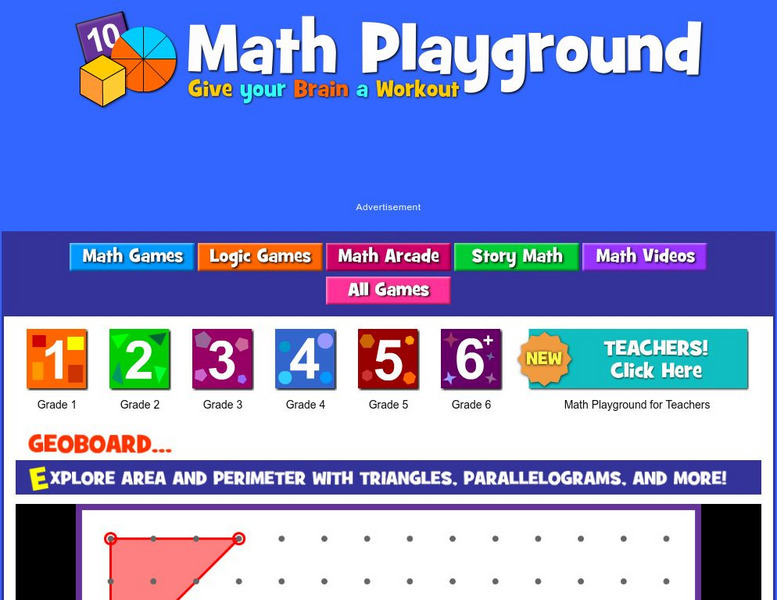CPALMS
Cpalms: Area of Rectangles: A More Efficient Way?
[Free Registration/Login Required] In this lesson, students will connect the concepts of counting each square unit and multiplying the side lengths to compute the area of a rectangle. They will extend this knowledge by computing a side...
Other
Math Learning Center: Virtual Geoboard
A geoboard that can be adapted for different grade levels. Choose from three types of geoboard and eight different elastic colors. Shapes can be duplicated, rotated, flipped, and filled in. There are also drawing tools as well as a...
Texas Instruments
Texas Instruments: Geoboard and Area
In this activity, students find areas of figures which are displayed on a grid. They also use the Geoboard application to find areas of figures they draw.
Texas Instruments
Texas Instruments: Geoboard App
Students use the Geoboard App to measure arcs, line segments, area, and perimeter, as well as rotate, reflect, and translate objects.
University of Waterloo (Canada)
University of Waterloo: How to Use the Geoboard
Four worksheets are linked which deal with area and perimeter of shapes constructed on the Geoboard. Additionally, a link is given to an online Geoboard so students may play with the model on their own.
Texas Instruments
Texas Instruments: Surround and Be Found! Triangular Areas, That Is!
In this activity, students use the Geoboard to determine the area of triangles using the surrounding rectangle technique. They also develop and use formulas to determine the area of triangles. [Requires Adobe Reader.]
Cut the Knot
Cut the Knot! Pick's Theorem
This site explains Pick's Theorem and contains an interactive geoboard and activity to help understand the theorem.
Science and Mathematics Initiative for Learning Enhancement (SMILE)
Smile: Geometry and the Geoboard
This site is a lesson plan for using a geoboard in a sixth grade geometry class. The lesson serves as an introduction to the geoboard and its uses in geometry. Some topics the lesson covers include helping to visualize shapes and and...
Illustrative Mathematics
Illustrative Mathematics: 6.g Same Base and Height, Variation 1
Make the following triangles on a geoboard. Remember that the pegs are equally spaced in a square grid. Compare the areas of the triangles. Aligns with 6.G.A.1.
ClassFlow
Class Flow: Geoboards
[Free Registration/Login Required] Geoboards bring challenge into the classroom as the student uses methods to measure length, area, and perimeters of polygons.
Texas Instruments
Texas Instruments: Move Along Little Vertex
In this activity, students use the Geoboard to determine the area of triangles having the same base and same height.
Texas Instruments
Texas Instruments: Slide Along
In this activity, students use the Geoboard to determine the areas of quadrilaterals between parallel lines. [Requires Adobe Reader.]
Texas Instruments
Texas Instruments: Cross Fencing Pastures
In this activity, students use the Geoboard to determine the areas of polygons by dissecting them into parts that are squares, rectangles, and triangles.
Texas Instruments
Texas Instruments: Get to the Point! Coordinate Geometry!
In this activity, students use the Geoboard to determine the area of any polygon using coordinates.
Texas Instruments
Texas Instruments: Pick and Choose! Using Pick's Theorem!
In this activity, students use the Geoboard to determine the area of any polygon using Pick's Theorem.
Math Playground
Math Playground: Geometry Board
Create polygons by stretching bands over pegs on this geometry board. Then find the area and perimeter of the shape you created.
